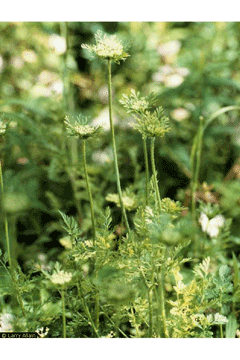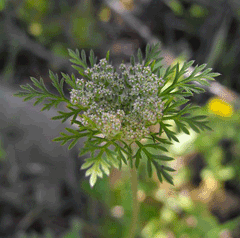 |
|
Larry Allain @ USDA-NRCS PLANTS Database |
 |
|
Translate this page:
Summary
Physical Characteristics

 Daucus pusillus is a BIENNIAL growing to 0.6 m (2ft) by 0.3 m (1ft in).
Daucus pusillus is a BIENNIAL growing to 0.6 m (2ft) by 0.3 m (1ft in).
See above for USDA hardiness. It is hardy to UK zone 5 and is not frost tender. The seeds ripen from August to September. The species is hermaphrodite (has both male and female organs) and is pollinated by Flies, beetles. The plant is self-fertile.
It is noted for attracting wildlife.
Suitable for: light (sandy), medium (loamy) and heavy (clay) soils and prefers well-drained soil. Suitable pH: mildly acid, neutral and basic (mildly alkaline) soils. It cannot grow in the shade. It prefers moist soil. The plant can tolerate maritime exposure.
UK Hardiness Map
US Hardiness Map
Synonyms
Plant Habitats
Meadow; Cultivated Beds;
Edible Uses
Edible Parts: Root
Edible Uses:
Root - raw or cooked[46, 61, 105, 161, 257].
References More on Edible Uses
Medicinal Uses
Plants For A Future can not take any responsibility for any adverse effects from the use of plants. Always seek advice from a professional before using a plant medicinally.
Antipruritic Blood purifier Febrifuge Poultice
The plant is antipruritic, blood purifier and febrifuge[257]. A decoction has been used to treat colds, itches, fevers and snakebites[257]. A poultice of the chewed plant has been applied to snakebites[257].
References More on Medicinal Uses
The Bookshop: Edible Plant Books
Our Latest books on Perennial Plants For Food Forests and Permaculture Gardens in paperback or digital formats.

Edible Tropical Plants
Food Forest Plants for Hotter Conditions: 250+ Plants For Tropical Food Forests & Permaculture Gardens.
More

Edible Temperate Plants
Plants for Your Food Forest: 500 Plants for Temperate Food Forests & Permaculture Gardens.
More

More Books
PFAF have eight books available in paperback and digital formats. Browse the shop for more information.
Shop Now
Other Uses
References More on Other Uses
Cultivation details
We have very little information on this plant, but it can be grown outdoors at least in southern Britain and probably in the north as well. It is likely to need a well-drained soil in a sunny position[K].
References Carbon Farming Information and Carbon Sequestration Information
Temperature Converter
Type a value in the Celsius field to convert the value to Fahrenheit:
Fahrenheit:
The PFAF Bookshop
Plants For A Future have a number of books available in paperback and digital form. Book titles include Edible Plants, Edible Perennials, Edible Trees,Edible Shrubs, Woodland Gardening, and Temperate Food Forest Plants. Our new book is Food Forest Plants For Hotter Conditions (Tropical and Sub-Tropical).
Shop Now
Plant Propagation
Seed - sow August/September or April in situ. The seed germinates better if it is cold stratified, therefore the autumn sowing is liable to be more successful.
Other Names
If available other names are mentioned here
Native Range
NORTHERN AMERICA: Canada (British Columbia (south)), United States (Kansas, Missouri, Illinois, Oklahoma, Colorado, Idaho, Oregon, Washington, Alabama, Arkansas, Florida, Georgia, Louisiana, Mississippi, North Carolina, South Carolina, Tennessee, New Mexico, Texas, Arizona, California), Mexico (Sonora) SOUTHERN AMERICA: Brazil (Paraná, Rio Grande do Sul, Santa Catarina), Argentina (Córdoba, Buenos Aires, Chubut, Corrientes, Entre Ríos, La Pampa, Neuquén, Río Negro, San Luis, Santiago del Estero), Chile (Biobío, Coquimbo, Maule, Libertador General Bernardo O Higgins, Región Metropolitana de Santiago, Aisén del General Carlos Ibañez del Campo, Los Lagos), Uruguay (Canelones, Artigas, Cerro Largo, Colonia, Florida, Lavalleja, Maldonado, Montevideo, Salto, San José, Soriano, Tacuarembó)
Weed Potential
Right plant wrong place. We are currently updating this section.
Please note that a plant may be invasive in one area but may not in your area so it's worth checking.
Conservation Status
IUCN Red List of Threatened Plants Status :

Growth: S = slow M = medium F = fast. Soil: L = light (sandy) M = medium H = heavy (clay). pH: A = acid N = neutral B = basic (alkaline). Shade: F = full shade S = semi-shade N = no shade. Moisture: D = dry M = Moist We = wet Wa = water.
Now available:
Food Forest Plants for Mediterranean Conditions
350+ Perennial Plants For Mediterranean and Drier Food Forests and Permaculture Gardens.
[Paperback and eBook]
This is the third in Plants For A Future's series of plant guides for food forests tailored to
specific climate zones. Following volumes on temperate and tropical ecosystems, this book focuses
on species suited to Mediterranean conditions—regions with hot, dry summers and cool, wet winters,
often facing the added challenge of climate change.
Read More
Expert comment
Author
Michx.
Botanical References
43
Links / References
For a list of references used on this page please go here
Readers comment
| Add a comment |
|
If you have important information about this plant that may help other users please add a comment or link below. Only comments or links that are felt to be directly relevant to a plant will be included. If you think a comment/link or information contained on this page is inaccurate or misleading we would welcome your feedback at [email protected]. If you have questions about a plant please use the Forum on this website as we do not have the resources to answer questions ourselves.
* Please note: the comments by website users are not necessarily those held by PFAF and may give misleading or inaccurate information.
To leave a comment please Register or login here All comments need to be approved so will not appear immediately.
|
Subject : Daucus pusillus
|
|
|
|